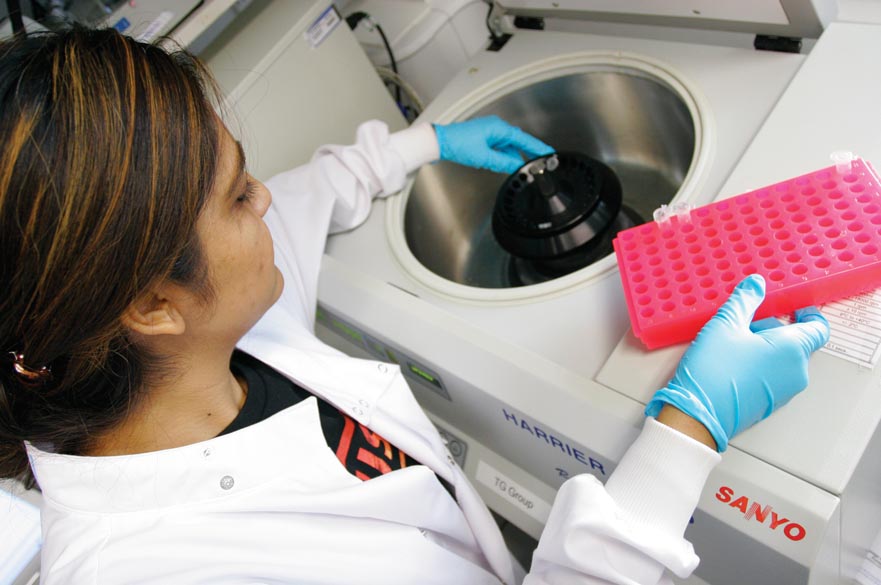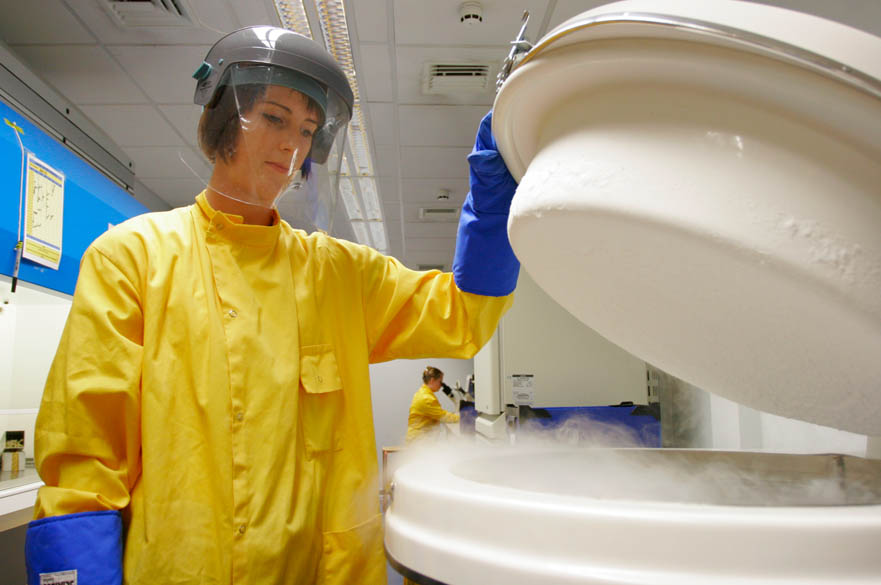Molecular Microbiology MSc
About this course
Designed to provide you with a multidisciplinary approach to the study of the molecular biology of micro-organisms.
You'll study the key concepts associated with molecular microbiology and use these when considering their role in health, disease and in the natural environment.
This course provides you with opportunities to study advanced principles of the metabolism and genetics of microbes, microbes involved in clinical health and the natural environment and infectious diseases. Further studies specialise in modern genomics and infectious disease diagnosis. Practical work forms a large proportion of your learning to ensure that you have extensive skills for employment or research and there is an emphasis on developing knowledge and understanding such that you acquire the skills, qualities and attributes expected by employers or for postgraduate research.
This course benefits from the excellent facilities and equipment available in the School of Science and Technology.
What you’ll study
This Molecular Microbiology Masters is made up of six core modules and a research project. If you are part-time or a sandwich student, you will continue to study the second year from the modules listed below.
Research Methods and Bioethics (20 cp)
This module encourages you to think beyond your own subject, and interact accordingly. You'll gain a solid foundation in literature review, research design and planning, data analysis and a poster presentation by focusing your studies on a related ethical issue. Ethical issues in research will also be explored, as you discover when and how to obtain ethical clearance in accordance with ethical governance at NTU.
Molecular Microbiology (20 cp)
This module provides you with a strong grounding in microbial structure, physiology and behaviour at the molecular level. The module content draws on recent research findings, to provide our students with awareness of the current trends in the field. By working through case studies, you’ll uncover the essentials of microbial genetics and molecular biology, including microbial structures and physiology; cell-cell communication; global regulatory circuits, and host –pathogen interaction.
Medical Microbiology (20cp)
Interactive and interesting eLearning material will be the basis for the module. You’ll develop an appreciation of the importance of medical microbiology in the diagnosis, prevention and treatment of disease, and gain a high-level of understanding of the subject.
Business and Enterprise (20cp)
You'll approach ideas generation in a creative manner to understand the role of new business concepts, and their development in the biosciences industry. You'll explore all aspects of starting up a new biosciences company, including new product development, marketing and research, pricing, distribution, and promotion.
Microbial Diagnostics (20cp)
This module aims to provide you with an understanding of the rationale and process of designing modern microbial diagnostic assays. Furthermore, you'll explore the theory and rationale of techniques such as culture-based diagnosis, serology, PCR, real-time PCR, microarrays, and sequencing for infectious disease diagnostics. You'll gain practical experience of performing real-time PCR detection from a sample.
Techniques in Macromolecular Analysis (20 cp)
The aims of this module are to provide an advanced knowledge and understanding of the techniques that can be used to isolate and purify macromolecules, and the approaches that can be used to track, study and predict macromolecular structure and function. You'll explore a range of current topics, and their application to macromolecular analysis. These topics will include the macromolecular analysis of proteins, protein purification programs and simulations, and protein bioinformatics.
Research Project (60 cp)
In consultation with a supervisor at NTU, you'll select a research topic comprising an original, defined research question (or series of such questions), and develop a written research proposal for the Project. You'll then present this proposal as part of the Research Methods and Bioethics module. Working individually with the guidance of supervisors, you'll design your experiments and computer-based approaches to address the research questions. A diary-style record of protocols or methods will be used to generate entries for your skills portfolio. You'll communicate your findings through a written thesis, and a poster presentation. For the MRes course, an interim written report and oral presentation will be assessed after six to eight months of work, in order to review your progress.
We regularly review and update our course content based on student and employer feedback, ensuring that all of our courses remain current and relevant. This may result in changes to module content or module availability in future years.
How you're taught
You will learn through:
- Lectures
- Guided reading supported by the University's virtual leaning portal
- Workshops
- Written and oral presentations
- Research reports
- Attendance regular research seminar
- Developing your skills portfolio
Research informed teaching
By daring to think differently our research is tackling real-world issues. The subjects you will study with us are informed by our research so you can be sure your knowledge will be cutting-edge in your field. In the last Research Excellence Framework (REF 2021) - the UK's system for assessing the quality and impact of research in universities - we’re proud that 99% of NTU’s Allied Health Professions, Dentistry, Nursing and Pharmacy submission was assessed to be world-leading or internationally excellent.
Learn a new language
Alongside your study you also have the opportunity to learn a new language. The University Language Programme (ULP) is available to all students and gives you the option of learning a totally new language or improving the skills you already have. Find out more about the ULP.
How you're assessed
You will be assessed by a variety of methods including:
- Research project
- Written assignment
- Case studies
- Poster and oral presentations
- Laboratory reports
- In-class tests
- Skills portfolio
Coursework (93%) and written (7%)
Contact hours
Lectures / seminars / workshops (20%) and independent study (80%)
Careers and employability
There are a wide range of career opportunities within microbiology. You will work with leading academics on your course, so you will have gained important academic and professional skills necessary to help you obtain employment in this field. At the end of the course, you will also have developed many transferable skills that will make you more attractive to potential employers in related areas of molecular bioscience and microbiology.
The Research Project and/or Placement will give you the skills you need to follow a career in research and development.
Skills portfolio
You will gather together relevant practical skills throughout laboratory classes producing a training record. This can be presented to potential employers as proof of competence in a laboratory setting. It also provides you with experience of managing what is essentially a personal development portfolio, which is now a standard tool for monitoring progression and performance in a scientific career as well as out in the sector.
Employability Team
The University's Employability Team has an enviable reputation for helping our graduates find employment and offers individual consultations. Sessions are available to all students at NTU on CV writing and interview technique. The Sandwich-route course offers you the opportunity to take a one-year placement or several smaller placements. If you start your this course in September/October then you will complete your placement following your taught modules and research project.
Postgraduate Diploma in Professional Practice
To qualify for the additional qualification of Postgraduate Diploma in Professional Practice (PGDIPP) you must submit a work placement portfolio which includes a placement diary, reflective report and updated CV, as well as deliver an oral presentation on your placement experience.
Help and support
We will work closely with you to help you strengthen your CV and interview techniques. During the placement year, an academic member of staff will visit at least twice to check on your progress and offer any advice.
Campus and facilities
You’ll mainly be studying in the Interdisciplinary Science and Technology Centre (ISTeC) and Rosalind Franklin Buildings with access to facilities including our extensive SuperLab, with space for almost 200 students.
Our self-contained, community-focused Clifton Campus has been designed to keep students busy between lectures. Catch-up with your coursemates in the Pavilion’s barista café and Refectory; brainstorm group presentations in chic and stylish study spaces; enjoy some proper R&R in The Point, home of our Students’ Union. The campus also hosts the multimillion-pound Clifton Sports Hub, offering great options for everyone — whatever your interests, and however competitive you’d like to get!
You’re also right next to the bright lights of Nottingham — one of Britain’s top 10 student cities, and one of Europe’s top 25. All through termtime, a dedicated on-campus bus service will get you to the heart of the action (and back) in under 25 minutes. You’ll find a city stuffed with history, culture, and well-kept secrets to discover at your leisure: enjoy lush green spaces, galleries, hidden cinemas and vintage shopping by day, and an acclaimed food, drink and social scene by night.
Entry requirements
UK students
Academic entry requirements: 2.2 honours degree or equivalent in a biological subject.
Applicants with relevant employment experience or qualifications will also be considered.
Additional requirements for UK students
There are no additional requirements for this course.
Other qualifications and experience
We welcome applications from students with non-standard qualifications and learning backgrounds and work experience. We consider credit transfer, vocational and professional qualifications, and any work or life experience you may have.
You can view our Recognition of Prior Learning and Credit Transfer Policy which outlines the process and options available, such as recognising experiential learning and credit transfer.
Getting in touch
If you need more help or information, get in touch through our enquiry form.
International students
Academic entry requirements: 2.2 honours degree or equivalent in a biological subject.
Applicants with relevant employment experience or qualifications will also be considered.
We accept equivalent qualifications from all over the world. Please check your international qualifications on our international entry requirements page.
English language requirements: See our English language requirements page for requirements for your subject and information on alternative tests and Pre-sessional English.
Additional requirements for international students
There are no additional requirements for this course.
English language requirements
View our English language requirements for all courses, including alternative English language tests and country qualifications accepted by the University.
If you need help achieving the language requirements, we offer a Pre-Sessional English for Academic Purposes course on our City campus which is an intensive preparation course for academic study at NTU.
Other qualifications and experience
We welcome applications from students with non-standard qualifications and learning backgrounds and work experience. We consider credit transfer, vocational and professional qualifications, and any work or life experience you may have.
You can view our Recognition of Prior Learning and Credit Transfer Policy which outlines the process and options available, such as recognising experiential learning and credit transfer.
Sign up for emails
Sign up to receive regular emails from the International Office. You'll hear about our news, scholarships and any upcoming events in your country with our expert regional teams.
Getting in touch
If you need advice about studying at NTU as an international student or how to apply, our international webpages are a great place to start. If you have any questions about your study options, your international qualifications, experience, grades or other results, please get in touch through our enquiry form. Our international teams are highly experienced in answering queries from students all over the world.
Policies
We strive to make our admissions procedures as fair and clear as possible. To find out more about how we make offers, visit our admissions policies page.











